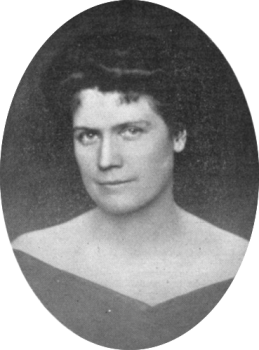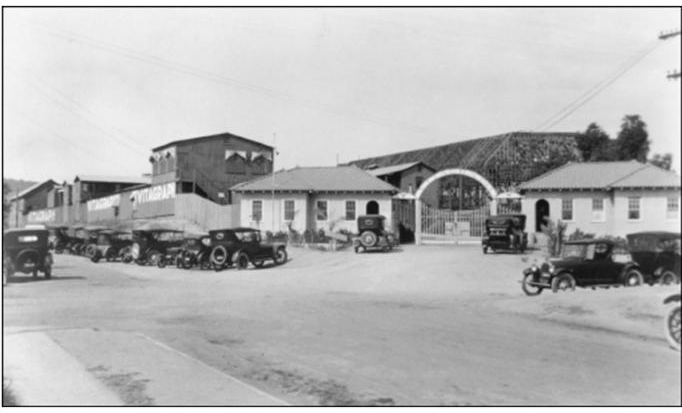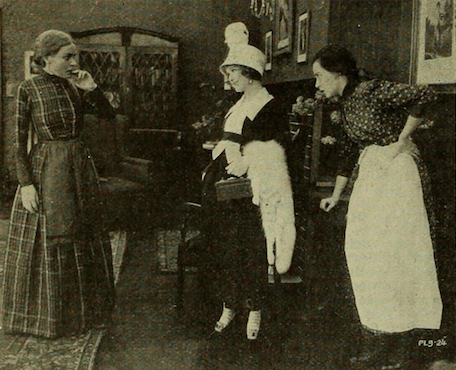
One hundred years ago this week, Grace Kingsley reported that the great soprano Nellie Melba had gone missing:
For three whole days Mme. Melba was lost. For three whole days frantic committees ran about Pasadena, where the singer was supposed to have alighted last Sunday, searching for her. There were committees on music, committees on entertainment, committees on flowers, and just committees in general, also there were fond mammas of prodigies who were willing to let the great Melba hear their little ones warble, and there were song writers with new ditties who were willing to hear Mme. Melba sing their songs—and none of them could find her.
On Tuesday Melba was found. Of course, she permitted herself to be found. She really hadn’t been making incognito trips into Bohemia for the sake of excitement, she hadn’t been kidnaped and held as ransom, she hadn’t been made away with by German spies. Melba was merely resting in a Pasadena sanatorium, like the nice, gentle lady she is—a modest and retiring sanatorium, where song writers cease from troubling and the press agents are at rest. For she was there incognito.
So celebrity hangers-on were equally annoying then. Kingsley wrote that Melba tried her best to find some symptoms, but she couldn’t find one. After she saw some of the treatments patients were receiving, she decided to leave – even press agents weren’t that bad.
Nellie Melba, 1910
Nellie Melba’s story lacks the mystery and melodrama of the disappearances of Aimee Semple McPherson and Agatha Christie, so nobody has made a movie about it. But it might be a pretty good comedy/biopic. By 1918, Melba had been singing professionally for over thirty years and was one of the most famous opera singers in the world. She performed her first farewell appearance in 1926, but her actual last concert was in 1930.

Kingsley told another story about illness, but it was the reverse of Dame Melba’s situation. The night before he was going leave for a Liberty Loan tour, Charlie Chaplin got sick. A doctor was called, and
once within Charlie’s apartment at the Athletic Club, the physician decided that Charlie had something very important and expensive the matter with him, and commanded the comedian to take to his bed and remain there, giving up his trip East. Ill as he was, he declared he couldn’t give up his trip.
The physician remained adamant. Then he gave orders to Charles Lapworth, one of Charlie’s aides-de-camp, to lock the door and remain outside if need be. Lapworth complied. But everybody forgot, apparently, that Charlie is an athlete, and this morning when they unlocked the door, too late, as they thought, for the comedian to get ready, bless you, he was gone! A few moments later Charlie’s Athletic Club friends were greeted over the telephone with a message to the effect Charlie was at Brother Sid’s and that he had collected a sufficient wardrobe with which to depart on his journey. Charlie had descended the fire escape, called a taxi, beat it out to Sid’s house and had been so well taken care of out there he was able to go on his journey.

Chaplin did get to New York safely, and gave a speech at a bond rally on Wall Street on April 8th, just before Douglas Fairbanks. He spent the rest of April touring the South and he returned to Los Angeles on May 12th. According to the LA Times, he sold $50,000,000 worth of bonds and he covered as many as four or five towns a day, making a speech in each.*

Kingsley mentioned that Los Angeles was going dry. Alcohol wasn’t completely banned under the Gandier ordinance, but only wine or beer could be served with a restaurant meal before 9 pm. It still made a big change for the film industry, because on Saturday, March 30th it closed every single bar in town. The LA Times reported on that last night:
In a blaze of reckless conviviality the 208 saloons of Los Angeles closed their doors at midnight last night forever…Early in the afternoon saloon patrons began to gather for the farewell visits at the drink emporiums. As the hours went by, the crowds increased, and every saloon was filled with men, while the bartenders were swamped with business. There was much hilarity, and some minor disturbances, but they were promptly squelched.**
A police officer was stationed at each saloon, but there were “amazingly few arrests” — only 13 (the previous Saturday night there were 26). Liquor vendors planned to appeal the ordinance all the way to the Supreme Court, but they weren’t successful. Country-wide Prohibition came along on January 17, 1920 and lasted until December 5, 1933. So the saloons weren’t closed forever, but it was an awfully long time.
*”C.Chaplin is Home,” Los Angeles Times, May 13, 1918.
**”City Drinks Toast to the Late J. Barleycorn,” Los Angeles Times, March 31, 1918.













 He wrote an autobiography, Splinters from Hollywood Tripods, in 1964, but he didn’t include the story of racing through a snowstorm in a dog sled to see his feared-dying wife. That had to have been memorable. In fact the only mention of her and his five sons was in a story about some actresses who demanded a married cameraman to shoot a semi-nude scene. Maybe the divorce was so awful, that he didn’t want to mention her.
He wrote an autobiography, Splinters from Hollywood Tripods, in 1964, but he didn’t include the story of racing through a snowstorm in a dog sled to see his feared-dying wife. That had to have been memorable. In fact the only mention of her and his five sons was in a story about some actresses who demanded a married cameraman to shoot a semi-nude scene. Maybe the divorce was so awful, that he didn’t want to mention her.







 The modern epic—the tremendous story of love and war—was swiftly flashed, last night, before a vast assembly of men and women thrilled and exalted by the gripping power, the overwhelming beauty and poignant pathos of David Wark Griffith’s masterpiece in photoplay, Hearts of the World.
The modern epic—the tremendous story of love and war—was swiftly flashed, last night, before a vast assembly of men and women thrilled and exalted by the gripping power, the overwhelming beauty and poignant pathos of David Wark Griffith’s masterpiece in photoplay, Hearts of the World.








